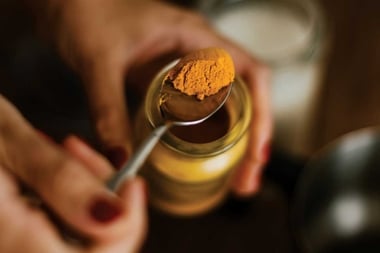
You may know cranberries best for their tart flavor and their annual visit to the Thanksgiving table, but there’s a lot more going on with these bright red berries than you may have heard about. The fruit of an evergreen shrub that grows in freshwater bogs, cranberries are produced mostly in southern Canada and northern United States. They are a member of the same family as blueberries, bilberries, and lingonberries and, just like their nutrient-powerhouse cousins, cranberries can add a lot of sweet benefits to your life year-round. Here are 10 reasons to add more cranberries to your day-to-day meals and snacks.
Nutrient-rich food choice

Raw cranberries are packed with vitamins and minerals including vitamin C, A, and K, as well as B-complex vitamins, calcium, potassium, manganese, and copper. They also contain a number of flavonoids, such as quercetin and anthocyanins, that act as antioxidants in the body.
However, be aware that dried cranberries, when compared to the same weight in fresh cranberries, contain more sugar and less nutrients.
Help protect your heart
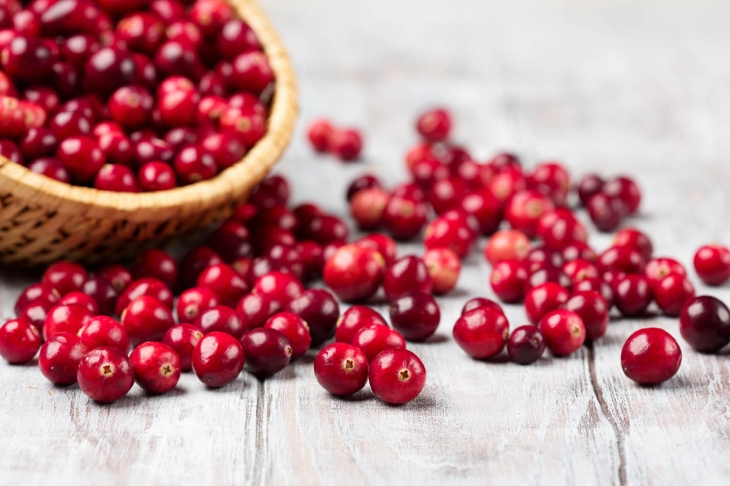
Cranberries can help lower blood pressure, cholesterol, inflammation, and oxidative stress, reducing your risk of heart disease and stroke in the process. These protective effects against cardiovascular disease are largely due to the berries’ antioxidant power and high dietary fiber content.
In addition to the fresh and whole forms of the food, cranberry juice and freeze-dried cranberry powder have also been shown to offer positive effects to cardiovascular health.
Boost your digestive health

Cranberries’ dietary fiber content helps to keep you regular. They also work to boost your overall gut health by encouraging helpful bacteria to grow in the gut, while reducing harmful bacteria and bile acids in your digestive system.
The antimicrobial properties of cranberries have been found to help reduce the presence of H. pylori in the stomach, which can lead to stomach ulcers and even cancer.
Good for the immune system
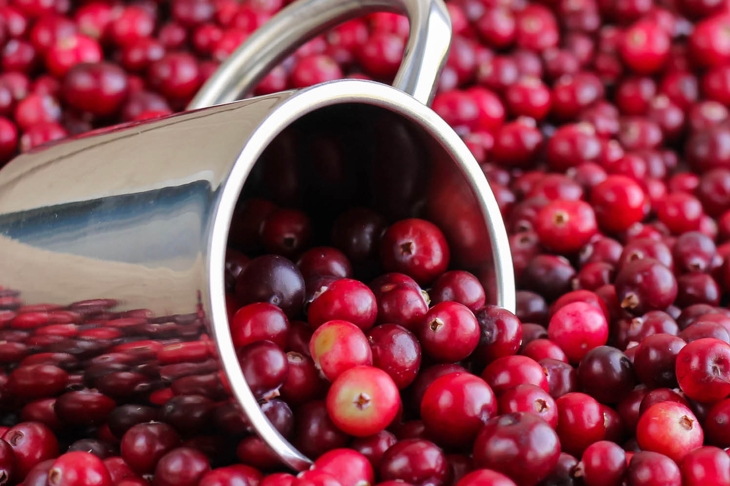
In addition to their antimicrobial properties, cranberries can help improve your immune function. Antioxidants contained in cranberries, including vitamin C and quercetin, support your immune system through their anti-inflammatory effects.
In particular, vitamin C helps mobilize the body’s immune response by supporting white blood cell function. One cup of raw cranberries can give you 25 percent of the daily requirement of this heavy-lifting vitamin.
Encourage healthy aging

Chronic inflammation in the body can lead to premature aging, higher risk of disease, and increased mortality. Cranberries’ variety of antioxidant phytonutrients calm inflammation in your body to support longevity and help you to age gracefully.
Additionally, the vitamin C contained in cranberries stimulates collagen production in the skin and provides protection from UV damage, preserving a healthy complexion to keep you looking fresh.
Reduce swelling

Cranberries contain salicylic acid, an anti-inflammatory compound that is similar to aspirin. Boosting salicylic acid levels in your body with the help of cranberries can help reduce swelling and has even been shown to help reduce muscle pain after exercise.
However, because of the food’s high salicylic acid content, be aware that if you have an allergy to aspirin or take aspirin regularly, it’s recommended to avoid cranberry supplements or large amounts of cranberry juice. Be sure you talk with your health care practitioner if you aren’t sure about your allergy specifications.
On your side against cancer
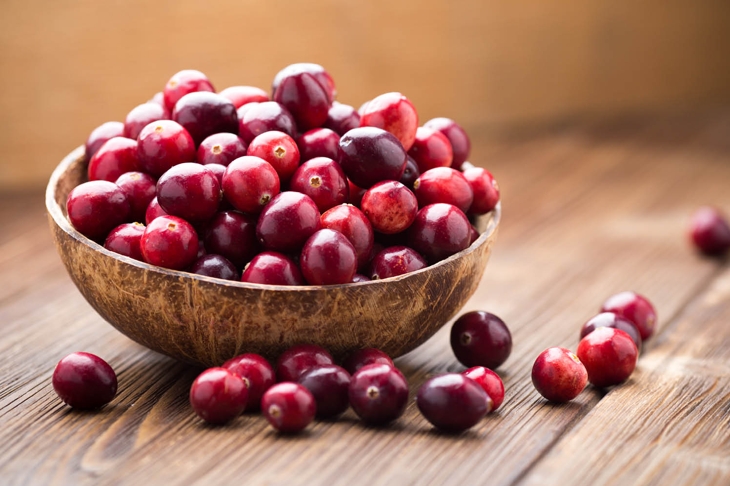
Research has demonstrated that cranberries have preventative effects against a range of cancers, such as lung, breast, and prostate, as well as cancers in the GI tract, including the stomach, colon, esophagus, intestine, and pancreas.
Cranberries have also been shown to possess chemopreventive properties—offering support to those going through treatment for cancer.
Aid for UTI prevention
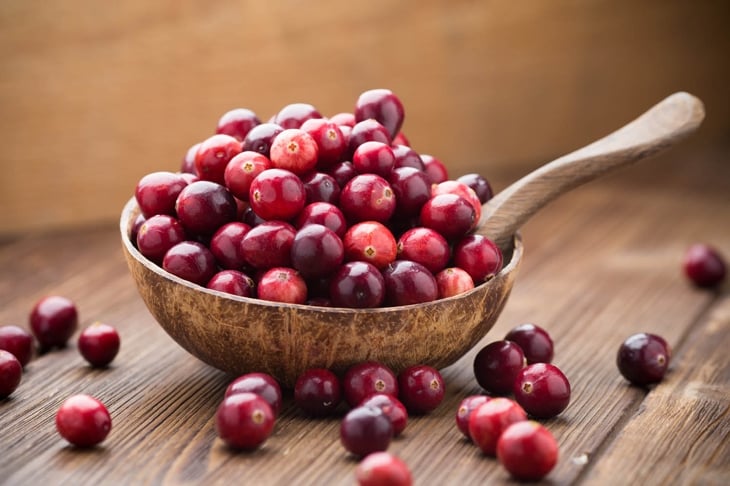
Cranberries’ antimicrobial properties have been widely noted in the prevention of urinary tract infections (UTIs). This protective effect stems from the proanthocyanidins (PACs) that the berries contain. PACs create a biofilm that traps the UTI-causing uropathogenic E. coli bacteria, preventing it from attaching to the lining of the urinary tract.
If you suffer from chronic UTIs, your doctor may recommend a cranberry supplement to help sidestep future infections.
Helps prevent blood clots
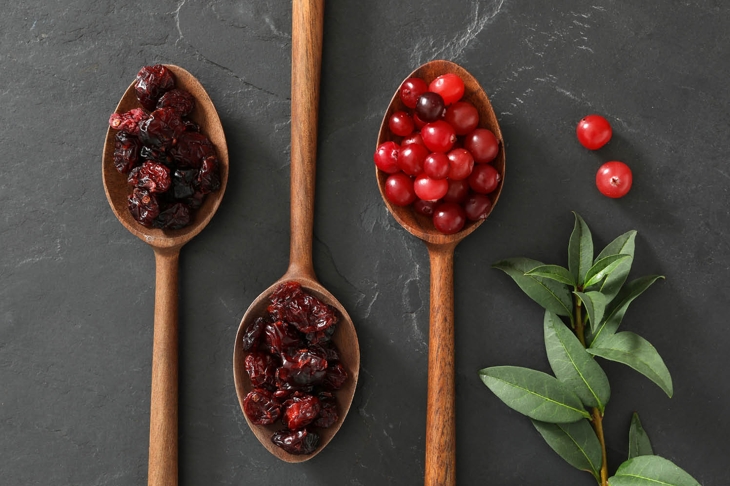
With credit to its salicylic acid content, which has an anticoagulating effect, cranberries have been linked to blood clot prevention.
However, if you are taking the blood thinning medication warfarin, be sure to consult your doctor before consuming cranberry products, as they can interact with the medication to increase the risk of bruising and bleeding.
Easy to add to your diet
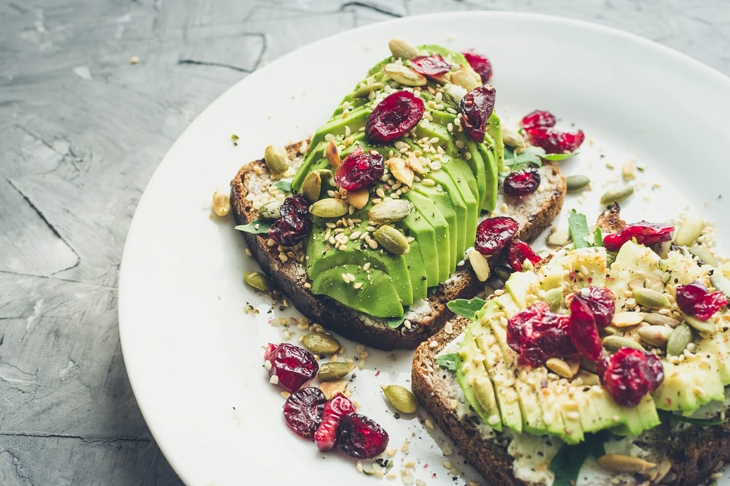
Cranberries are sold fresh, dried, frozen, powdered, as juice, and as a supplement. It’s a versatile ingredient to add to all aspects of your diet, including smoothies, tea, baked goods, trail mix, and salads.
If you decide to get your cranberries in juice form, make sure to check out these tips to select a quality juice.



